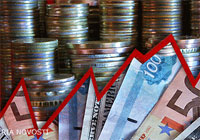GDP growth may slightly exceed estimate at 3.6% in 2012 – Belousov

MOSCOW. Dec 10 (Interfax) – Russian Economic Development Minister Andrei Belousov has forecasted that the country’s GDP may grow 3.5%-3.6% this year.
“This year we are coming to 3.5-3.6%. Next year, according to fairly optimistic estimates, we will approach 4%,” he said at a Sunday meeting of Cabinet members and Kremlin administration officials with President Vladimir Putin’s election agents.
The Economic Development Ministry’s current official 2012 GDP estimate is 3.5%.
Belousov said that in the near future Russia will not be able to balance its needs with its capabilities, particularly in the budget system, if growth will be below 4%.
“A level of approximately 5% is the level that we need to reach in the medium-term,” he said.
Assessing the situation in the global economy, the minister remarked that the United States, the eurozone and China are now competing strategically, for which economic model will dominate.
“All countries, including China, the United States and Europe, despite the fact that the crisis is most acute in Europe, are actually competing not for tactics, they are competing for strategy: which economic model will dominate in the medium-term future,” Belousov said, adding that he thinks the United States is so far dominating in this race.
He also said that all countries, despite budget consolidation and acute problems with budget deficits, are increasing investment in technology because they understand that there will be a very rapid change in technological platforms by the middle of the decade.
“There are places where this is fairly clearly evident: this is above all new materials, completely new capabilities of information technologies, development of new areas such as photonics,” Belousov said.
This means that by the end of the decade there might be a situation where traditional industrial systems will be significantly devalued and uncompetitive with new sectors. “And this is where the real race in the world is now heating up,” Belousov said.
Commenting on the competitive positions of leading economies, he said that in terms of costs the U.S. position is two times better than in Europe in terms of prices for electricity and gas. Also, real wages in the U.S. have not risen for a long time, which is also a competitive advantage.
“To this one should also add the battle the Americans are fighting on all fronts for weakening the dollar in regard to other currencies,” Belousov said, adding that there was a similar situation in 1984-1985, when the U.S. “forced” Japan to revalue the yen, after which the rate of economic growth in Japan fell by 2-3 percentage points and Japan has essentially been in a permanent systemic crisis since then.
“The Americans are now putting approximately the same pressure on China, and this is also a policy to increase the competitiveness of the national economy that the United States is pursuing,” Belousov said.
